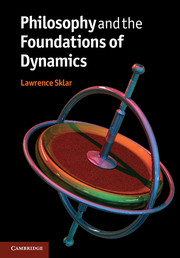Albert, D. 2000. Time and Chance. Cambridge, MA: Harvard University Press.
Alexander, H., ed. 1956. The Leibniz–Clarke Correspondence. Manchester: University of Manchester Press.
Baird, D., ed. 1998. Heinrich Hertz: Classical Physicist, Modern Philosopher. Dordrecht: Kluwer.
Barbour, J. 2001. The Discovery of Dynamics. Oxford: Oxford University Press.
Barbour, J. and Bertotti, B. 1977. “Gravity and inertia in a Machian framework,” Il Nuovo Cimento B, 38, 1–27.
Barbour, J. and Bertotti, B. 1982. “Mach's principle and the structure of dynamical theories,” Proceedings of the Royal Society A, 382, 295–306.
Barbour, J. and Pfister, H., eds. 1995. Mach's Principle: From Newton's Bucket to Quantum Gravity. Boston, MA: Birkhäuser.
Barrow-Green, J. 1997. Poincaré and the Three Body Problem. Princeton, NJ: Princeton University Press.
Blackmore, J., ed. 1972. Ernst Mach: His Life, Work and Influence. Berkeley, CA: University of California Press.
Blackmore, J., ed. 1992. Ernst Mach – A Deeper Look. Dordrecht: Kluwer
Bradley, J. 1971. Mach's Philosophy of Science. London: Athlone Press.
Clagett, M. 1959. Science of Mechanics in the Middle Ages. Madison, WI: University of Wisconsin Press.
Descartes, R. 1983. Principles of Philosophy. Dordrecht: Reidel.
Devaney, R. 1986. An Introduction to Chaotic Dynamical Systems. Menlo Park, CA: Benjamin.
Diacu, F. and Holmes, P. 1996. Celestial Encounters: The Origins of Chaos and Stability. Princeton, NJ: Princeton University Press.
Dugas, R. 1988. A History of Mechanics. New York: Dover.
Earman, J. 1970. “Who's afraid of absolute space,” Australasian Journal of Philosophy, 48(3), 287–319.
Earman, J. 1989. World Enough and Space-Time. Cambridge, MA: MIT Press.
Evans, J. 1998. The History and Practice of Ancient Astronomy. Oxford: Oxford University Press.
Galileo, . 1914. Dialogues Concerning Two New Sciences. New York: Dover.
Galileo, . 1967. Dialogue Concerning the Chief World Systems. Berkeley, CA: University of California Press.
Garber, D. 1992. Descartes’ Metaphysical Physics. Chicago, IL: Chicago University Press.
Goldstein, H. 1950. Classical Mechanics. Cambridge, MA: Addison-Wesley.
Hanca, J., Tulejab, S., and Hancova, M. (2004). “Symmetries and conservation laws,” American Journal of Physics, 72(4), 428–435.
Herival, J. 1965. The Background of Newton's Principia. Oxford: Oxford University Press.
Hertz, H. 1956. The Principles of Mechanics Presented in a New Form. New York: Dover.
Lagrange, J. 1997. Analytical Mechanics. Dordrecht: Kluwer.
Lanczos, C. 1970. The Variational Principles of Mechanics. New York: Dover.
Lewis, D. 2009. “Ramseyan humility,” in Braddon-Mitchell, D. and Nola, R. (eds.), Conceptual Analysis and Philosophical Naturalism. Cambridge, MA: MIT Press.
Kuhn, T. 1957. The Copernican Revolution. Cambridge, MA: Harvard University Press.
Mach, E. 1959. The Analysis of Sensations. New York: Dover.
Mach, E. 1960. The Science of Mechanics. LaSalle, IL: Open Court.
Moser, J. 1973. Stable and Random Motions in Dynamical Systems. Princeton, MA: Princeton University Press.
Noll, W. 1974. “The foundations of classical mechanics in the light of recent advances in continuum mechanics,” in W. Noll, Foundations of Mechanics and Thermodynamics. New York: Springer-Verlag.
Neuenschwander, D. E. 2010. Emmy Noether's Wonderful Theorem. Baltimore, MA: Johns Hopkins University Press.
Newton, I. 1947. Mathematical Principles of Natural Philosophy (The Principia). Berkeley, CA: University of California Press.
Pannekoek, A. 1961. A History of Astronomy. New York: Dover.
Poincaré, H. 1952. Science and Hypothesis. New York: Dover.
Price, H. 1996. Time's Arrow and Archimedes’ Point. Oxford: Oxford University Press.
Putnam, H. 1962. “What theories are not,” in Nagel, E., Suppes, P., and Tarski, A. (eds.), Logic, Method and the Philosophy of Science. Stanford: Stanford University Press. Reprinted in H. Putnam, Mathematics, Matter and Method, vol. I, pp. 215–227, 1975. Cambridge: Cambridge University Press.
Reichenbach, H. 1956. The Direction of Time. Berkeley, CA: University of California Press.
Santilli, R. M. 1978. Foundations of Theoretical Mechanics, I: The Inverse Problem in Newtonian Mechanics. New York: Springer-Verlag.
Santilli, R. M. 1983. Foundations of Theoretical Mechanics, II: Birkhoffian Generalizations of Hamiltonian Mechanics. New York: Springer-Verlag.
Saunders, S. “Hertz's principles,” in D. Baird (ed.), Heinrich Hertz: Classical Physicist, Modern Philosopher. Dordrecht: Kluwer, pp. 123–154.
Sklar, L. 1974. Space, Time and Spacetime. Berkeley, CA: University of California Press.
Sklar, L. 1980. “Semantic analogy,” Philosophical Studies, 38, 217–234. Reprinted in L. Sklar, Philosophy and Spacetime Physics, 1985. Berkeley, CA: University of California Press.
Sklar, L. 1993. Physics and Chance. Cambridge: Cambridge University Press.
Sneed, J. 1971. The Logical Structure of Mathematical Physics. New York: Humanities Press.
Smith, P. 1998. Explaining Chaos. Cambridge: Cambridge University Press.
Stein, H. 1967. “Newtonian space-time,” Texas Quarterly, 10(3), 174–200.
Sternberg, S. 1969. Celestial Mechanics. New York: W. A. Benjamin.
Su, S.-C. and Chu, M.-C. 2009. “Is the Universe rotating?,” Astrophysical Journal, 703(1), 354–361.
Swerdlow, N. M. and Neugebauer, O. 1984. Mathematical Astronomy in Copernicus’ De Revolutionibus. New York: Springer.
Szabó, I. 1977. Geschichte der mechanischen Prinzipien. Basel: Birkhäuser.
Taub, L. 1993. Ptolemy's Universe. Chicago, IL: Open Court.
Truesdell, C. 1968. Essays in the History of Mechanics. New York: Springer-Verlag.
Westfall, R. 1971. Force in Newton's Physics. London: Macmillan.
Westfall, R. 1980. Never at Rest: A Biography of Isaac Newton. Cambridge: Cambridge University Press.
Whittaker, E. T. 1937. A Treatise on the Analytical Dynamics of Particles and Rigid Bodies, with an Introduction to the Problem of Three Bodies, 4th edn. Cambridge: Cambridge University Press.
Winter, A. 1947. The Analytical Foundations of Celestial Mechanics. Princeton, MA: Princeton University Press.
Wittgenstein, L. 1958. Philosophical Investigations. Oxford: Blackwell (especially items 244–309).
Woodward, J. 2009. “Scientific explanation,” Stanford Encyclopedia of Philosophy (online).





